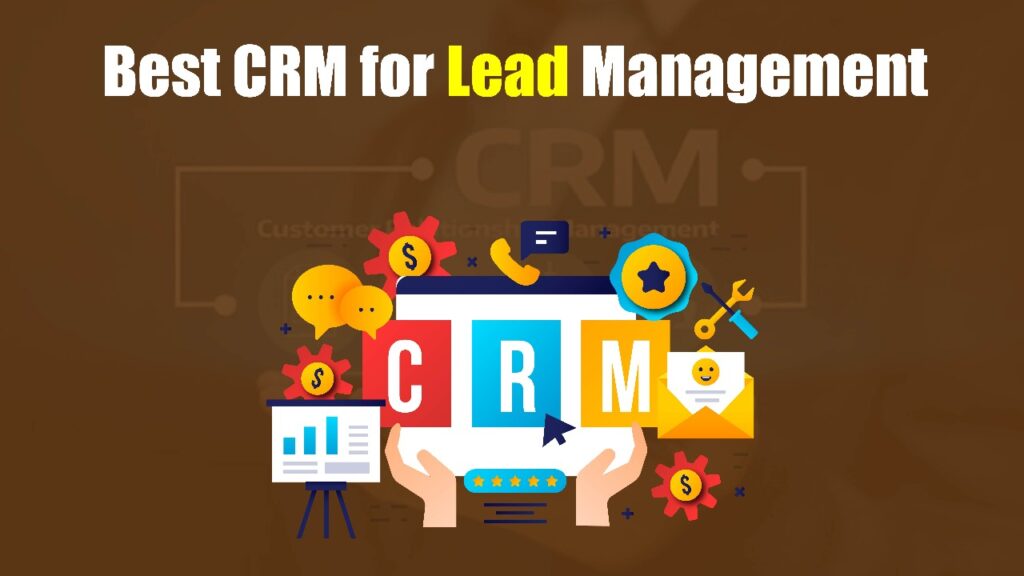Have you ever wondered which CRM is truly the best for managing leads in 2026?
With hundreds of CRM tools available today, all claiming to offer automation, AI features, better workflows, and “the ultimate lead management system,” the decision can feel overwhelming. Businesses don’t just want features — they want reliability, ease of use, scalability, and a CRM that genuinely improves how they manage and convert leads.
If you’ve ever felt confused about which CRM is worth your time, money, and effort, you’re not alone. Many companies are now shifting toward cloud-based CRM platforms that offer flexibility, automation, and real-time insights for lead management. These modern systems are designed to streamline operations, reduce manual tasks, and ensure that no lead falls through the cracks.
In this guide, we break down the 10 Best CRM Software for Lead Management in 2026, giving you a clear and straightforward understanding of what lead management CRM is, how it works, and why it has become essential for businesses of all sizes.
What Is Lead Management CRM?
Lead management CRM is a digital system designed to help businesses track, manage, and nurture leads from the first point of contact to deal closure. Rather than juggling spreadsheets, emails, and scattered notes, a CRM centralizes all lead information in a secure, accessible platform.
Modern lead management CRMs allow businesses to:
- Capture leads from multiple sources, including website forms, social media platforms, and email campaigns.
- Track interactions and communication history for each lead, providing a complete engagement timeline.
- Score leads based on engagement, interest, and likelihood to convert.
- Automate follow-ups, reminders, and other workflow tasks to improve efficiency.
- Gain actionable insights through advanced analytics and reporting.
By centralizing this data, businesses can improve conversion rates, save time, and make smarter sales and marketing decisions. For example, instead of manually following up with every prospect, teams can focus on high-potential leads identified by the system, increasing the chance of closing deals faster.
How Does Lead Management CRM Work?
Lead management CRMs operate by collecting, organizing, and analyzing lead information from multiple channels, such as:
- Website forms and landing pages
- Email campaigns and newsletters
- Social media interactions
- Phone calls and SMS messages
- Sales meetings and customer inquiries
Once collected, this data is securely stored in the cloud, allowing teams to access it from anywhere, at any time. This is particularly valuable for sales representatives working remotely or in the field. Here’s how a lead management CRM typically functions:
Lead Capture
The CRM automatically captures leads from all connected sources, ensuring no opportunity is missed. For instance, if a potential customer submits a form on your website, the CRM instantly logs the information and assigns it to the appropriate sales representative.
Lead Organization
All information is organized into detailed lead profiles, including contact details, engagement history, and communication preferences. This makes it easier for sales teams to personalize communication and track progress.
Automation
Automation is a core feature of lead management CRMs. Tasks such as follow-ups, reminders, lead scoring, and workflow actions are handled automatically, reducing manual work and ensuring timely interactions.
Real-Time Syncing
Any update in the CRM appears instantly across all devices and user accounts. This real-time syncing improves collaboration among sales, marketing, and customer service teams, ensuring everyone has the latest information.
Reporting & Insights
CRMs provide detailed analytics to evaluate lead quality, track sales performance, and measure conversion trends. These insights allow businesses to identify bottlenecks, optimize processes, and make data-driven decisions.
This workflow ensures that businesses capture, nurture, and convert leads efficiently while minimizing human errors.
Benefits of Lead Management CRM
Lead management CRMs offer numerous advantages for businesses of all sizes. Here are the key benefits explained in detail:
Centralized Lead Data
All lead information is stored in a single system, making it easy for sales and marketing teams to access, update, and manage details in real-time. This eliminates duplication, reduces confusion, and ensures everyone works from the same accurate data.
Improved Conversion Rates
With features like lead scoring, automated follow-ups, and structured nurturing workflows, businesses can prioritize high-value prospects. This ensures that top-quality leads receive focused attention, significantly improving conversion rates over time.
Better Team Collaboration
A CRM allows teams to track every lead interaction, reducing miscommunication and ensuring that all team members are aligned. For example, marketing teams can see which leads are actively engaging, while sales teams know exactly when to reach out.
Automation of Repetitive Tasks
Tasks such as sending follow-up emails, setting reminders, and moving leads through pipelines are automated. This frees up time for sales representatives to focus on strategic activities like relationship-building and closing deals.
Real-Time Analytics & Reporting
CRMs provide analytics dashboards that allow businesses to measure lead performance, identify trends, and make informed decisions. Managers can track key metrics such as lead conversion rates, response times, and engagement patterns.
Scalability for Growing Businesses
As a business expands, CRMs can handle an increasing number of leads, users, and customized workflows without major overhauls. This makes lead management systems future-proof, accommodating growth seamlessly.
Enhanced Customer Experience
With complete lead histories and actionable insights, sales teams can personalize communication, address specific needs, and provide timely responses, leading to stronger trust and long-term customer relationships.
Reduced Costs & Improved Efficiency
Cloud-based CRMs reduce manual work, minimize errors, and cut operational costs. By streamlining processes, businesses can save both time and money while boosting overall productivity and sales effectiveness.
Improved Decision-Making
CRMs provide real-time insights into sales and marketing performance. Businesses can quickly identify which strategies work, which leads are most promising, and how to allocate resources effectively.
Competitive Advantage
By leveraging CRM data and automation, businesses can respond faster to prospects, anticipate customer needs, and maintain a competitive edge in their industry.
Top 10 Best CRM Software for Lead Management in 2026
Here is the list of the top 10 Best CRM Software in Netherlands that offer reliable features, easy usability, and strong performance in 2026.
- HubSpot CRM
- Salesforce CRM
- Zoho CRM
- Pipedrive
- Freshsales (Freshworks)
- Microsoft Dynamics 365
- Insightly CRM
- Nimble CRM
- SugarCRM
- Creatio CRM
1. HubSpot CRM – Best CRM for Startups & SMEs in 2026
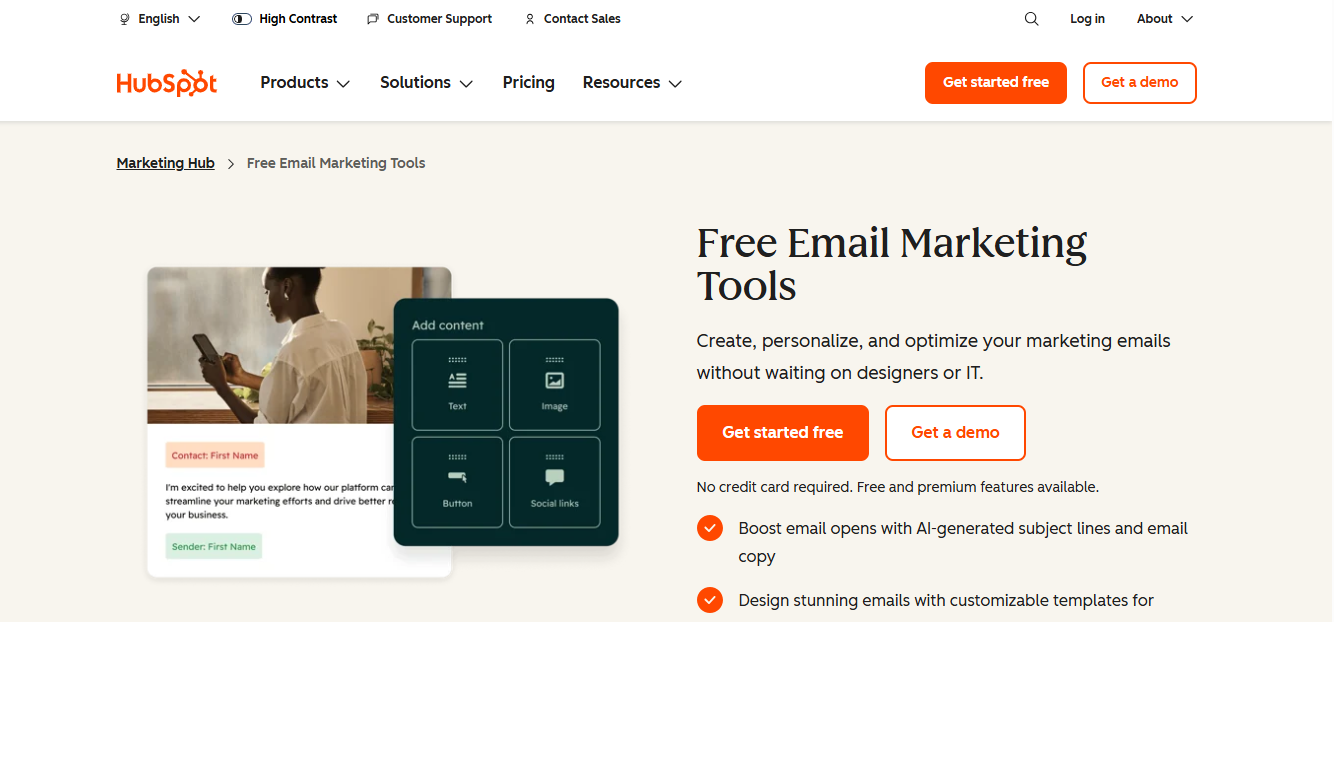
Overview
HubSpot CRM is a cloud-based platform known for its simplicity, automation capabilities, and strong integration with marketing tools. It is ideal for startups and small to medium-sized businesses that want to improve their lead management process with minimal technical setup. HubSpot allows teams to capture, organize, and nurture leads efficiently using AI insights, customizable sales pipelines, and email automation.
The system offers real-time tracking of communication history and provides predictive suggestions to help improve conversion rates. With a highly intuitive interface and powerful free plan, HubSpot CRM is a great choice for businesses looking to streamline workflows, enhance customer engagement, and scale operations without heavy investment in technology or training.
Key Features
- Lead Management & Sales Pipelines: Customize deal stages to streamline the sales process and track every lead’s progress.
- AI Sales Assistant: Suggests optimal follow-up time, analyzes engagement, and predicts conversion possibilities.
- Omnichannel Engagement: Manage customer communications via email, live chat, WhatsApp, and social platforms from one interface.
- Workflow Automation: Automate follow-ups, lead nurturing, task creation, and reminders to improve efficiency.
- Reporting & Performance Dashboards: Real-time analytics to monitor KPIs, sales trends, and team productivity.
Pros
- Highly user-friendly design, suitable for businesses without CRM experience.
- Includes a robust free plan covering essential CRM capabilities.
- Strong integration with email and marketing tools for seamless workflows.
- Efficient automation helps simplify lead nurturing and follow-ups.
- Scales effectively as businesses grow and add new sales processes.
Cons
- Advanced AI and automation tools require higher subscription tiers.
- Pricing may increase significantly with additional users and modules.
- Offers limited deep customization compared to enterprise-level CRMs.
- Marketing automation features often require separate paid upgrades.
- Reporting features are restricted in basic and free plans.
Pricing (2026)
- Free Plan: Unlimited users with basic CRM functionality.
- Starter: ~€20/user/month (annual).
- Professional: ~€65/user/month (annual); includes automation and AI insights.
- Enterprise: ~€110/user/month; advanced customization and enhanced reporting.
Final Verdict
HubSpot CRM is an excellent choice for startups and growing businesses in 2026 that want a powerful yet simple CRM system for lead management. Its strong automation, AI-powered insights, and seamless marketing integration make it ideal for teams looking to boost conversions and streamline workflows. With an accessible interface and scalable features, HubSpot CRM is a future-ready solution for businesses aiming to enhance sales performance without complexity.
2. Salesforce CRM – Best Enterprise-Level CRM for Lead Management in 2026
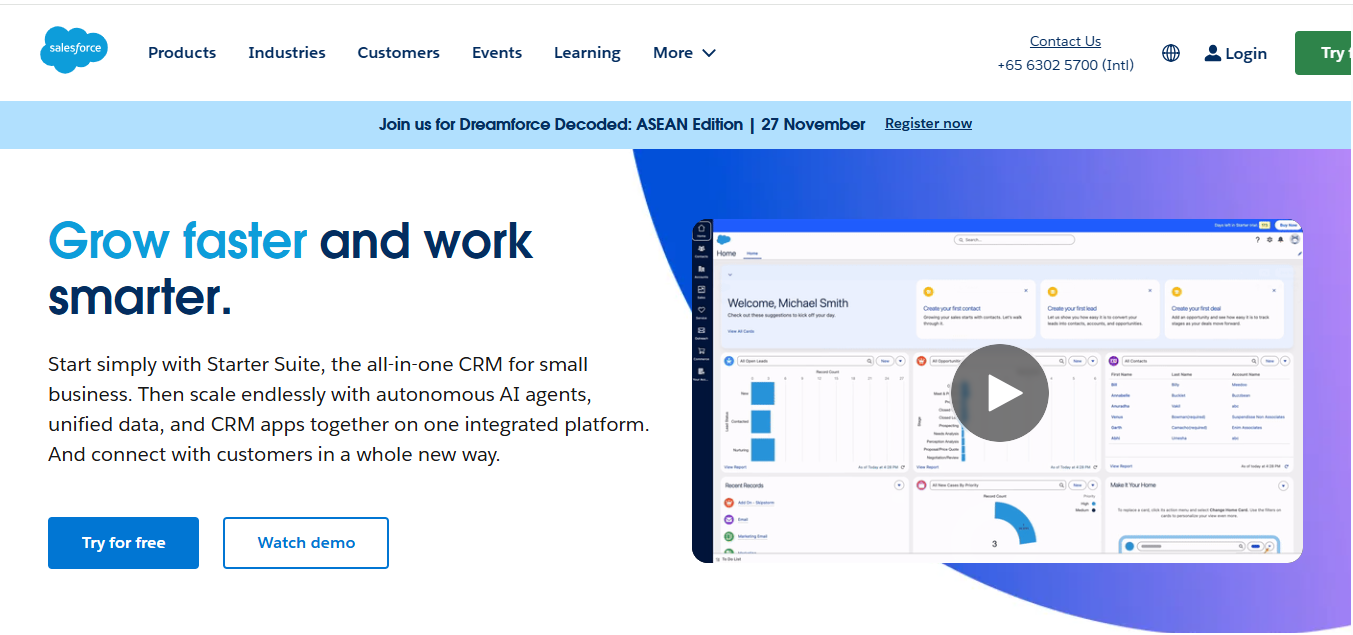
Overview
Salesforce CRM is one of the world’s most powerful and customizable CRM platforms, widely used by medium to large enterprises. It offers deep automation, AI-driven insights, and extensive integration capabilities, making it excellent for complex lead management workflows. Powered by Einstein AI, Salesforce provides predictive lead scoring, opportunity forecasting, and smart sales recommendations.
Its cloud-based structure enables teams to access real-time data from anywhere, while advanced customization lets businesses tailor pipelines, workflows, and dashboards to fit their unique processes. Salesforce is best suited for growth-oriented companies that need high scalability, high-level reporting, and end-to-end automation for large sales teams.
Key Features
- Lead & Opportunity Management: Track and manage leads across multiple stages with customizable sales pipelines.
- Einstein AI Predictions: AI-powered forecasting, deal recommendations, and predictive lead scoring for better conversions.
- Multichannel Communication: Manage communication via email, calls, social media, and web integrations inside the CRM.
- Workflow & Process Automation: Automate lead routing, follow-ups, approvals, and repetitive sales tasks.
- Advanced Reporting & Analytics: Get detailed performance insights, revenue forecasts, and team productivity reports.
Pros
- Highly scalable system ideal for medium to large enterprises.
- Advanced AI features that help automate decision-making and lead prioritization.
- Deep customization options across pipelines, automation, and dashboards.
- Strong integration support with thousands of third-party applications.
- Excellent data security and advanced compliance management.
Cons
- Can be expensive when advanced modules and AI features are included.
- Requires CRM experience or admin skills for setup and configuration.
- Interface may feel complex for small teams or beginners.
- Some advanced features may require additional licensing.
- Customization and workflow setup may take longer compared to simpler CRMs.
Pricing (2026)
- Starter: ~€25/user/month (annual).
- Professional: ~€75/user/month (annual); includes lead management automation.
- Enterprise: ~€125/user/month (annual); includes AI insights and advanced customization.
- Unlimited: ~€175/user/month; includes full automation tools and premium support.
Final Verdict
Salesforce CRM is the best choice for established and fast-growing businesses in 2026 that require a highly customizable and data-driven CRM for lead management. With its AI-powered forecasting, scalable architecture, and advanced automation, Salesforce supports complex sales operations and large teams. If your business needs deep customization and enterprise-level performance, Salesforce CRM delivers exceptional long-term value and future-ready capabilities.
3. Zoho CRM – Best AI-Powered CRM for Lead Management in 2026
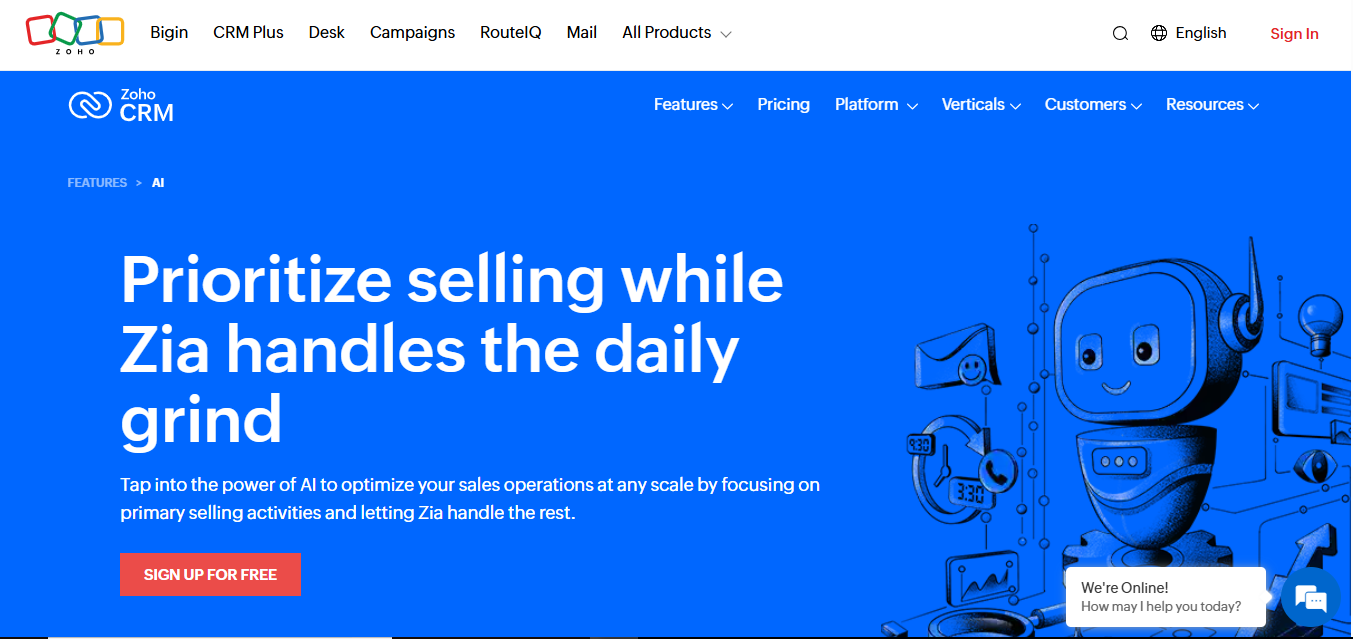
Overview
Zoho CRM is a highly popular cloud-based platform known for its affordability, flexibility, and strong AI-powered capabilities. Designed for startups, SMEs, and growing businesses, it helps manage leads, automate sales tasks, and improve engagement through intelligent data insights. With Zia AI, Zoho identifies sales trends, predicts deal outcomes, and suggests optimal follow-up times.
Its intuitive interface and modular structure make customization easy, while built-in automation tools streamline workflows from lead acquisition to conversion. Zoho CRM is particularly effective for businesses seeking a cost-friendly solution with advanced AI, real-time analytics, and process automation without requiring heavy technical setup.
Key Features
- AI Assistant (Zia): Predicts outcomes, analyzes engagement patterns, and recommends next best actions for leads.
- Sales Workflow Automation: Automate follow-ups, lead assignment, approvals, and scoring.
- Multichannel Engagement: Manage interactions across email, calls, live chat, WhatsApp, and social media.
- Blueprint Process Management: Design structured pipelines to guide teams through each sales stage.
- Custom Dashboards & Reports: Track KPIs, conversion rates, and team performance in real time.
Pros
- Powerful AI capabilities at a lower price compared to competitors.
- Highly customizable interface and drag-and-drop Canvas builder.
- Strong omnichannel communication support for better lead engagement.
- Advanced reporting tools offering deeper visibility into performance.
- Scalable platform suitable for small teams and growing enterprises.
Cons
- Advanced AI features only available in upper-tier plans.
- Interface may appear cluttered to first-time CRM users.
- Blueprint automation requires some technical understanding.
- Limited premium support in lower-priced packages.
- Can be slower when handling very large datasets.
Pricing (2026)
- Free: Up to 3 users with basic CRM functionality.
- Standard: ~€15/user/month (annual).
- Professional: ~€25/user/month (annual); includes automation.
- Enterprise: ~€42/user/month (annual); includes Zia AI and advanced workflow tools.
- Ultimate: ~€55/user/month (annual); advanced analytics and customization.
Final Verdict
Zoho CRM is one of the smartest and most affordable CRM platforms for lead management in 2026. With strong AI assistance, automation capabilities, and customizable workflows, it helps businesses enhance productivity, prioritize high-value leads, and improve decision-making. Ideal for organizations that want powerful features without enterprise-level costs, Zoho CRM is an excellent long-term solution for both small teams and growing companies.
4. Pipedrive – Best Visual Pipeline CRM for Lead Management in 2026
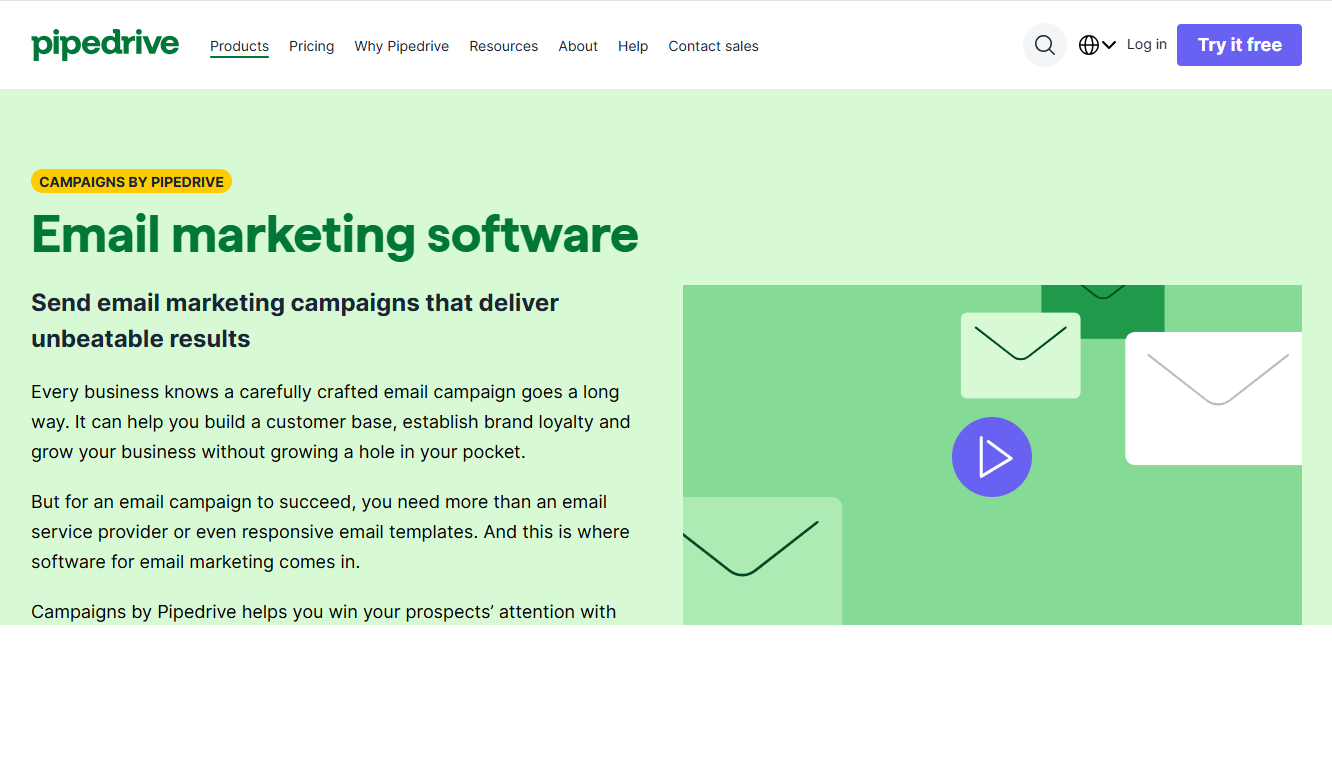
Overview
Pipedrive is a user-friendly CRM built specifically to help sales teams visually track and manage leads throughout each stage of the pipeline. Known for its drag-and-drop interface, it offers simplicity, speed, and highly practical workflow features. Ideal for startups and SMEs, Pipedrive focuses on boosting conversion rates by helping businesses monitor activities, manage deals, and automate follow-ups.
The CRM integrates seamlessly with email tools, lead capture forms, and marketing software. Its automation features support sales teams by scheduling reminders, updating deal stages, and assigning tasks automatically. Pipedrive is particularly suited for teams wanting a straightforward, visual-centric CRM that eliminates complexity and enables a faster sales process.
Key Features
- Visual Sales Pipelines: Drag-and-drop leads through each stage for clear visibility.
- Lead & Deal Automation: Auto-assign leads, set tasks, and follow-ups.
- Email Integration: Track communication history and sync messaging.
- Activity & Goal Tracking: Monitor individual and team targets in real time.
- Custom Fields & Pipelines: Tailor workflows to different lead management strategies.
Pros
- Extremely easy to use with a clean, visual interface.
- Helps teams stay organized with structured pipeline views.
- Quick setup process with minimal CRM training needed.
- Efficient task automation that boosts productivity.
- Affordable pricing ideal for smaller or growing businesses.
Cons
- Limited AI capabilities compared to advanced CRMs.
- Custom reporting options are less flexible.
- Not ideal for large enterprises with complex workflows.
- Advanced automation requires higher pricing plans.
- No built-in marketing automation; requires third-party integrations.
Pricing (2026)
- Essential: ~€14/user/month (annual); basic lead and deal tracking.
- Advanced: ~€24/user/month (annual); workflow automation.
- Professional: ~€49/user/month (annual); advanced reporting and custom fields.
- Power: ~€59/user/month (annual); team permissions and project management tools.
- Enterprise: ~€79/user/month (annual); complete customization and priority support.
Final Verdict
Pipedrive is an excellent choice for businesses seeking a simple, visual CRM for lead management in 2026. With its intuitive design and drag-and-drop pipelines, it helps teams stay focused on sales activities and speed up conversions. While it may lack advanced AI and enterprise-level features, its affordability and practicality make it ideal for startups, small teams, and companies needing a fast, easy-to-implement CRM solution.
5. Freshsales (Freshworks) – Best All-in-One CRM for Lead Management in 2026
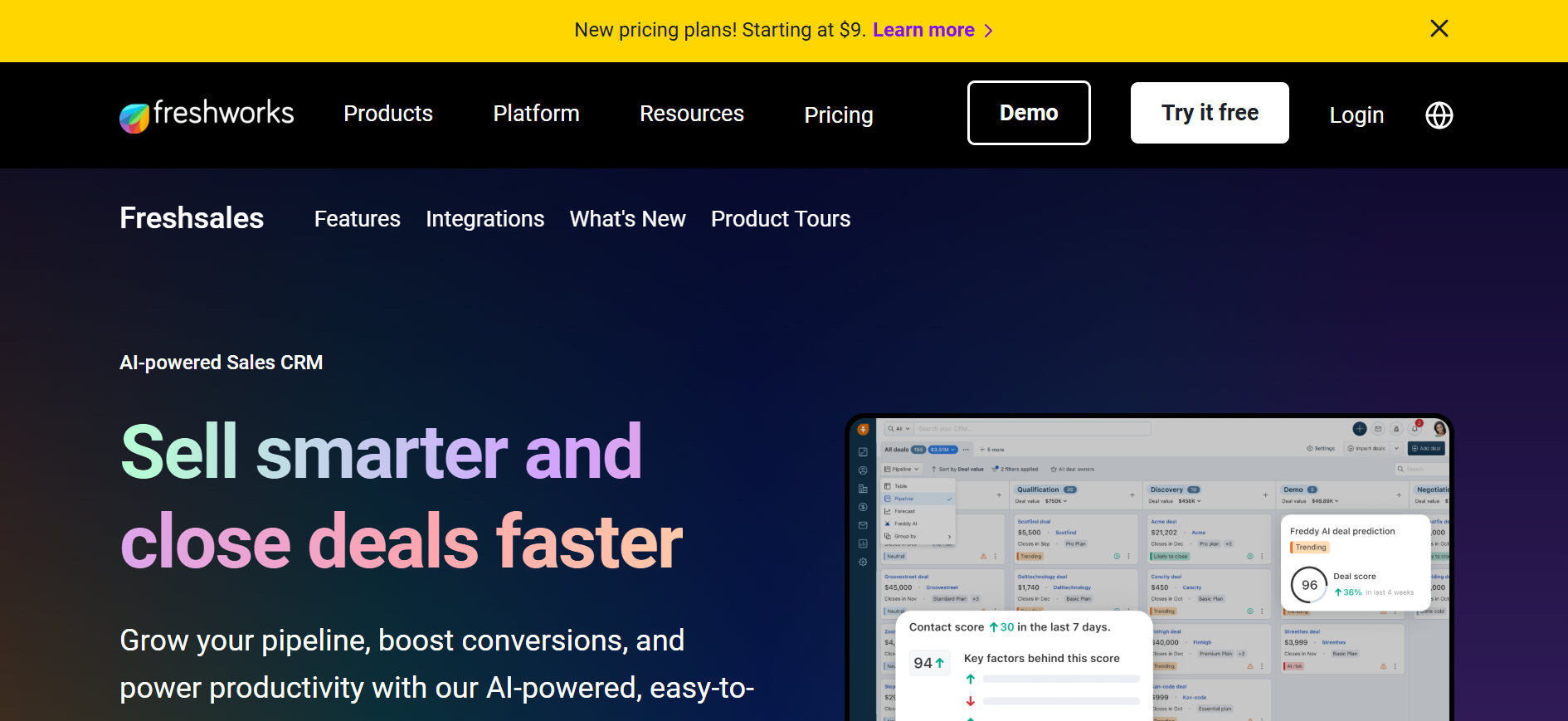
Overview
Freshsales is a cloud-based CRM designed to provide an all-in-one solution for managing leads, sales, and customer interactions. It is ideal for small to mid-sized businesses that want a unified platform combining AI-powered lead scoring, multichannel communication, and workflow automation. Freshsales helps teams capture leads from email, chat, phone, and social media while providing actionable insights to prioritize high-value prospects.
The platform’s intuitive interface, combined with built-in automation and advanced reporting tools, allows sales teams to focus on nurturing relationships instead of administrative tasks. With predictive analytics, customizable pipelines, and easy integration with marketing and productivity tools, Freshsales ensures businesses can convert leads faster while scaling operations efficiently.
Key Features
- AI-Powered Lead Scoring: Automatically ranks leads based on engagement, behavior, and likelihood to convert.
- Multichannel Communication: Manage emails, calls, chat, and social media from one centralized platform.
- Workflow Automation: Automate repetitive tasks such as follow-ups, reminders, and lead assignment for improved efficiency.
- Customizable Sales Pipelines: Track leads visually through stages and adjust pipelines to match your sales process.
- Reports & Dashboards: Generate real-time analytics to monitor KPIs, conversion rates, and team productivity.
Pros
- All-in-one platform reduces the need for multiple tools.
- AI-driven lead scoring helps prioritize high-potential opportunities.
- User-friendly interface suitable for teams without advanced CRM experience.
- Automation features save time and streamline workflows.
- Scalable solution for small teams growing into larger operations.
Cons
- Advanced AI features require higher-tier plans.
- Some integrations are limited in lower-tier subscriptions.
- Reporting customization is less flexible compared to enterprise CRMs.
- Setup can be complex for teams with unique sales processes.
- Mobile app functionality may be limited compared to desktop features.
Pricing (2026)
- Free Plan: Limited users with basic CRM functionality.
- Growth: ~€15/user/month (annual); includes basic automation and analytics.
- Pro: ~€39/user/month (annual); AI insights, lead scoring, and advanced reporting included.
- Enterprise: ~€69/user/month (annual); advanced customization, predictive analytics, and priority support.
Final Verdict
Freshsales is an ideal CRM for businesses seeking a complete lead management solution in 2026. Its combination of AI-powered scoring, multichannel communication, and workflow automation helps teams focus on converting leads efficiently. With customizable pipelines, advanced analytics, and scalability, Freshsales empowers businesses to enhance sales performance while reducing administrative workload. It is particularly well-suited for growing companies that need an all-in-one platform for leads and sales management.
6. Microsoft Dynamics 365 – Best Enterprise CRM for Lead Management in 2026
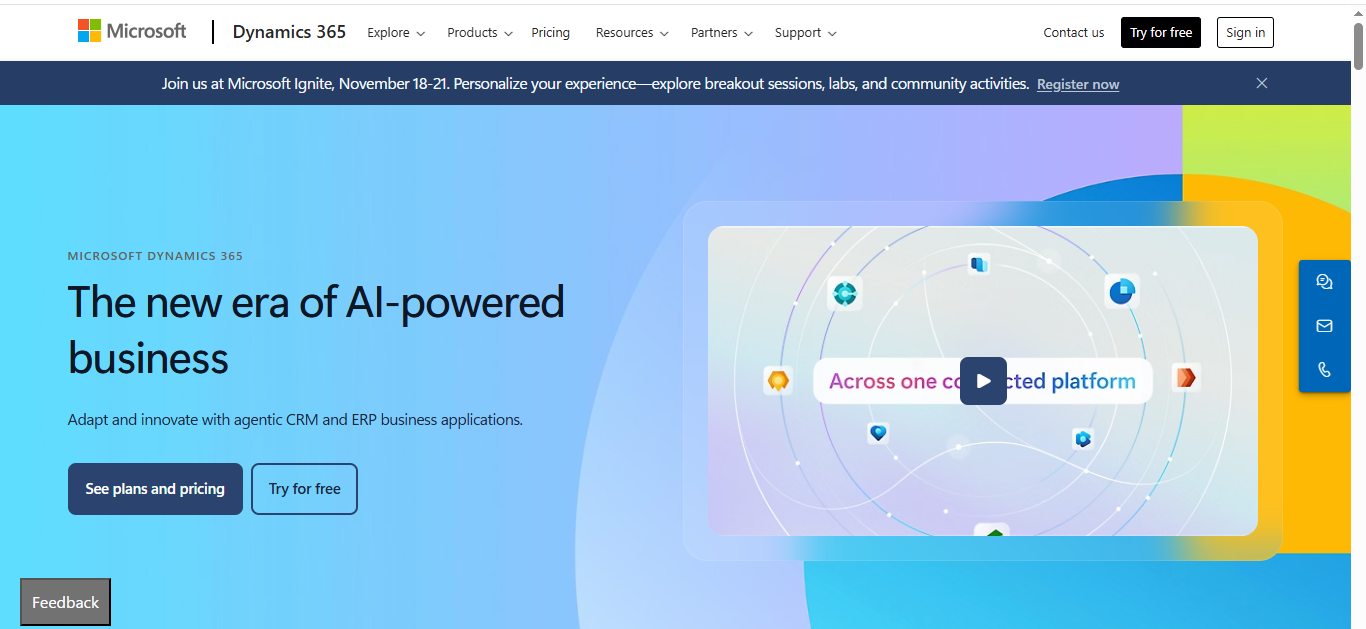
Overview
Microsoft Dynamics 365 is a powerful cloud-based CRM platform designed for mid-sized to large businesses that require advanced lead management and sales automation. The system integrates seamlessly with Microsoft Office 365 tools, enabling teams to track leads, manage opportunities, and collaborate efficiently across departments. Dynamics 365 combines AI-powered insights, customizable workflows, and predictive analytics to help businesses prioritize leads, forecast revenue, and improve overall sales performance.
With its secure cloud infrastructure and extensive enterprise-level capabilities, Dynamics 365 provides a centralized platform for managing customer interactions, monitoring pipeline health, and automating repetitive sales tasks. Its robust reporting and real-time analytics make it ideal for organizations that need actionable insights to make smarter, data-driven decisions.
Key Features
- AI-Powered Lead Scoring: Automatically evaluates leads based on engagement, likelihood to convert, and historical data.
- Customizable Pipelines & Workflows: Tailor deal stages, automate approvals, and align sales processes with business requirements.
- Seamless Office 365 Integration: Sync emails, calendar events, and documents for streamlined communication and collaboration.
- Advanced Reporting & Analytics: Generate detailed dashboards to track KPIs, pipeline performance, and conversion trends.
- Security & Compliance: Built-in data protection and GDPR compliance ensure secure management of customer information.
Pros
- Highly scalable and suitable for large enterprises.
- Deep integration with Microsoft productivity tools enhances team efficiency.
- AI-driven insights support smarter lead prioritization and decision-making.
- Strong security features and compliance with data regulations.
- Extensive customization options to fit complex sales processes.
Cons
- Higher learning curve for new users or smaller teams.
- Implementation can be time-consuming and may require IT support.
- Subscription costs are higher compared to mid-market CRMs.
- Some features require additional Microsoft modules or add-ons.
- Mobile experience may not be as intuitive as desktop.
Pricing (2026)
- Sales Professional: ~€65/user/month (annual); includes core lead and opportunity management.
- Sales Enterprise: ~€95/user/month (annual); advanced analytics, AI insights, and automation included.
- Customer Engagement Plan: ~€115/user/month (annual); full suite of modules for marketing, sales, and service.
- Dynamics 365 Premium: Custom pricing; includes enterprise-level customization, advanced AI, and priority support.
Final Verdict
Microsoft Dynamics 365 is a robust CRM ideal for businesses in 2026 that require enterprise-level lead management capabilities. Its AI-powered insights, deep Office 365 integration, and advanced reporting tools help teams convert leads efficiently and make smarter decisions. While setup and subscription costs may be higher, the platform’s scalability, security, and customization make it a strong choice for mid-sized and large organizations seeking a comprehensive CRM solution.
7. Insightly CRM – Best CRM for Project-Driven Lead Management in 2026
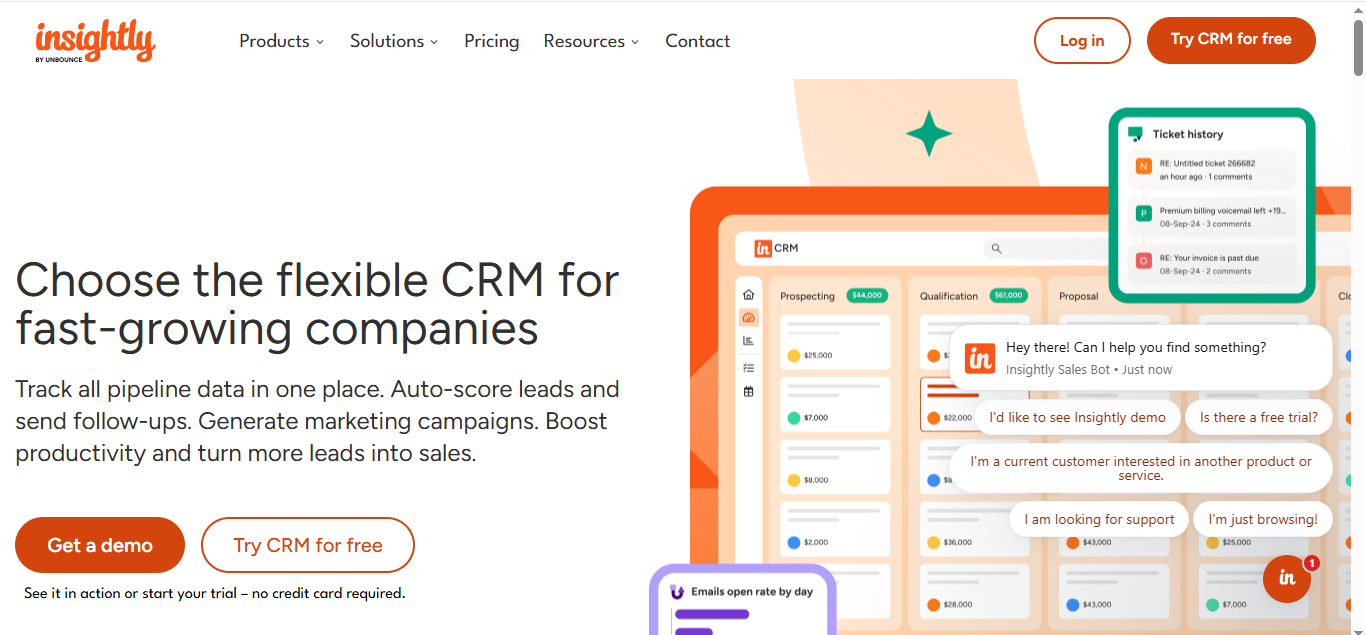
Overview
Insightly CRM is a cloud-based platform designed for service-oriented and project-driven businesses that want to combine lead management with project tracking. It provides a centralized system for managing leads, contacts, sales opportunities, and customer relationships while keeping projects and tasks organized. Insightly helps teams capture leads from multiple channels, automate follow-ups, and gain actionable insights to improve conversion rates.
With its intuitive interface, customizable dashboards, and workflow automation, Insightly allows businesses to monitor every stage of the sales process and align lead management with ongoing projects. Its integration with email, social media, and productivity tools ensures teams can collaborate effectively while maintaining a clear focus on both leads and project delivery.
Key Features
- Lead & Opportunity Management: Track leads from initial contact to conversion while managing deals and opportunities efficiently.
- Project & Task Tracking: Align leads and customer interactions with projects and tasks to streamline workflows.
- Workflow Automation: Automate repetitive tasks, reminders, and follow-ups to improve team efficiency.
- Customizable Reports & Dashboards: Generate detailed analytics to monitor sales performance, project status, and KPIs.
- Integration & Collaboration Tools: Connect with email, calendar, and third-party apps for seamless team collaboration.
Pros
- Combines CRM and project management in a single platform.
- User-friendly interface suitable for small and mid-sized teams.
- Workflow automation reduces repetitive tasks and increases efficiency.
- Custom reporting provides insights into both sales and project performance.
- Scalable for businesses that grow and manage multiple projects concurrently.
Cons
- Limited advanced AI features compared to enterprise CRMs.
- Reporting customization can be complex for beginners.
- Some integrations require third-party tools or paid plans.
- Mobile app functionality may not cover all desktop features.
- Customer support can vary depending on subscription tier.
Pricing (2026)
- Free Plan: Up to 2 users with basic CRM functionality.
- Plus: ~€29/user/month (annual); includes workflow automation and basic analytics.
- Professional: ~€49/user/month (annual); advanced reporting, integrations, and automation included.
- Enterprise: ~€99/user/month (annual); full customization, priority support, and project management features.
Final Verdict
Insightly CRM is an excellent choice for businesses in 2026 that need a combination of lead management and project tracking. Its workflow automation, customizable dashboards, and integration capabilities help teams manage leads effectively while keeping projects on track. Suitable for service-based and project-driven companies, Insightly ensures efficient lead nurturing, improved collaboration, and smarter decision-making, making it a future-ready CRM solution.
8. Nimble CRM – Best CRM for Relationship-Focused Lead Management in 2026
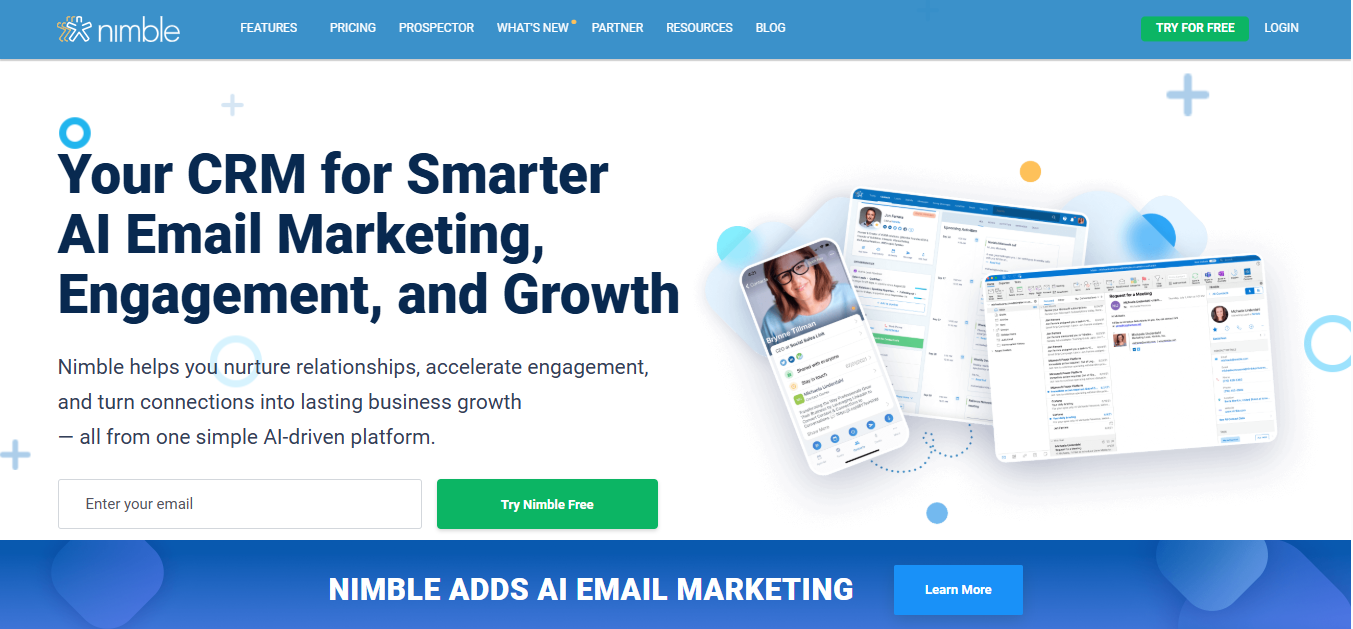
Overview
Nimble CRM is a cloud-based CRM platform designed for small teams and businesses that prioritize building strong relationships with leads and customers. It excels at social lead capture, allowing teams to gather and organize contact information from LinkedIn, Twitter, email, and other social platforms. Nimble helps businesses track interactions, automate follow-ups, and gain insights into lead engagement, making it easier to nurture relationships and convert prospects.
With an intuitive interface, Nimble enables teams to manage contacts, pipelines, and communications from a single platform. Its smart analytics, automated reminders, and social insights provide actionable intelligence that helps sales and marketing teams make informed decisions. Nimble is particularly well-suited for relationship-driven businesses that rely on personal engagement and social networking to generate and nurture leads.
Key Features
- Social Lead Capture: Automatically gather leads and contact details from social media platforms like LinkedIn, Twitter, and Facebook.
- Contact Management: Maintain a unified database with engagement history, communication preferences, and notes.
- Automated Follow-Ups & Reminders: Ensure timely communication and prevent leads from slipping through the cracks.
- Pipeline & Task Management: Visualize and track lead stages while managing tasks efficiently.
- Analytics & Insights: Monitor engagement metrics, lead quality, and team performance with actionable reports.
Pros
- Excellent for teams that rely on social media for lead generation.
- User-friendly interface suitable for small businesses and startups.
- Automation of follow-ups and reminders improves engagement and efficiency.
- Centralized contact management simplifies tracking and communication.
- Affordable pricing makes it accessible for small teams with limited budgets.
Cons
- Lacks advanced AI features compared to enterprise-level CRMs.
- Limited integration options with some third-party tools.
- Reporting capabilities are less comprehensive than larger CRMs.
- Customization options are restricted in lower-tier plans.
- Best suited for smaller teams, not ideal for large enterprises.
Pricing (2026)
- Basic: ~€19/user/month (annual); core CRM and contact management features.
- Business: ~€29/user/month (annual); includes automation, social lead capture, and task management.
- Enterprise: Custom pricing; advanced customization, integrations, and priority support included.
Final Verdict
Nimble CRM is a top choice for businesses in 2026 that prioritize relationship-driven lead management. Its social lead capture, automated follow-ups, and centralized contact database make it ideal for small teams and startups looking to engage leads effectively. Nimble’s intuitive design, affordability, and actionable insights ensure better lead nurturing, improved customer relationships, and a streamlined sales process, making it a practical solution for relationship-focused organizations.
9. SugarCRM – Best Customizable CRM for Lead Management in 2026
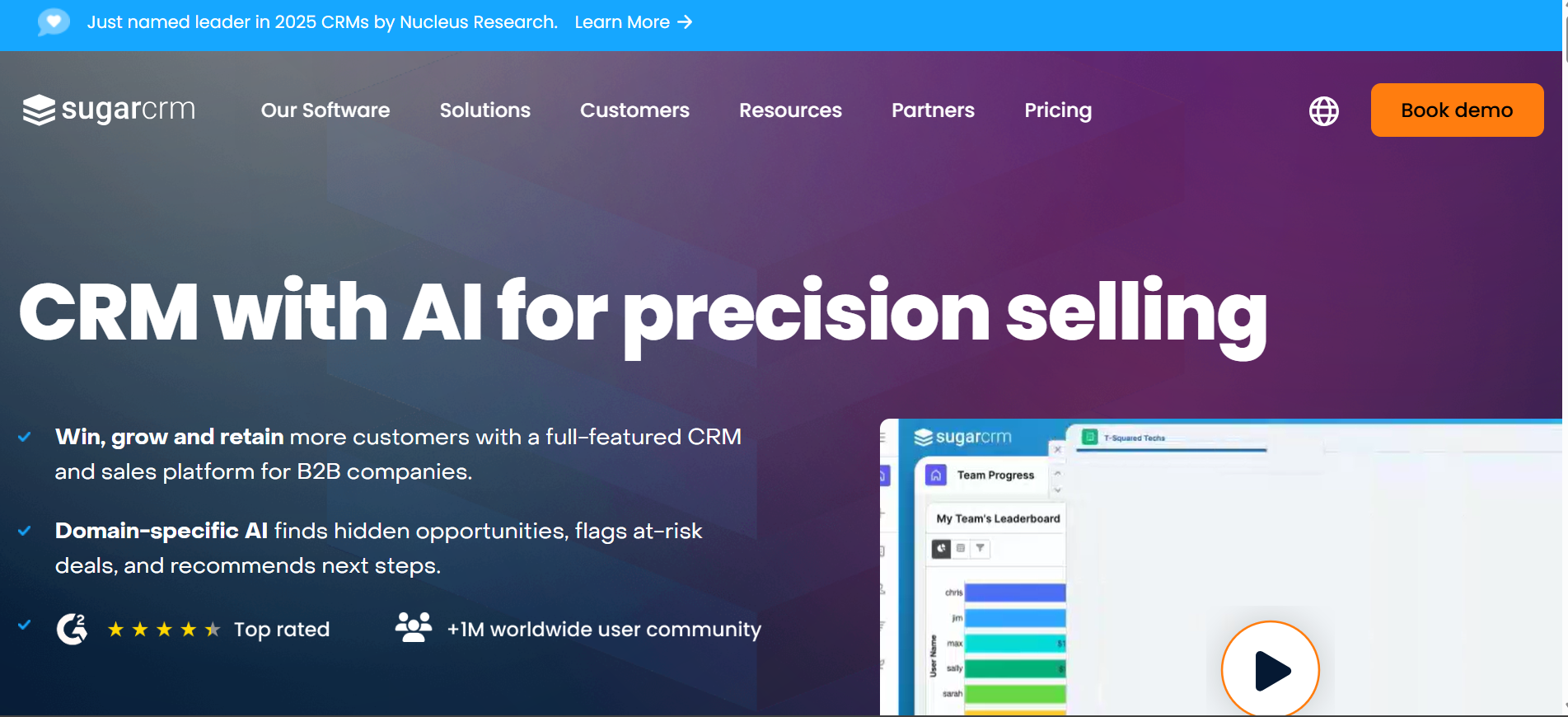
Overview
SugarCRM is a highly customizable cloud-based CRM platform that provides robust lead management capabilities for businesses of all sizes. Designed to meet the needs of enterprises and growing companies, SugarCRM helps teams capture leads from multiple sources, track interactions, and automate workflows to improve conversion rates. With AI-powered insights and advanced reporting, SugarCRM ensures that businesses can prioritize leads effectively and make data-driven decisions.
SugarCRM’s flexibility allows companies to tailor dashboards, modules, and workflows to their specific sales processes. Integration with email, social media, and other third-party applications ensures seamless communication and efficient lead management. Its combination of automation, analytics, and AI capabilities makes it a strong choice for businesses seeking a configurable and intelligent CRM solution.
Key Features
- Lead Capture & Management: Centralize leads from multiple sources, including email, web forms, and social media.
- AI-Powered Insights: Predict lead outcomes, prioritize high-potential leads, and identify trends for better decision-making.
- Workflow Automation: Automate repetitive tasks such as follow-ups, lead assignment, and pipeline progression.
- Customizable Dashboards & Reports: Create tailored dashboards and reports to track KPIs, conversion rates, and sales performance.
- Integration & Collaboration: Connect with email, productivity tools, and third-party apps for seamless teamwork.
Pros
- Highly flexible and customizable, suitable for enterprises with complex sales processes.
- AI-powered insights help prioritize leads and improve conversion rates.
- Advanced reporting and dashboards provide actionable data for informed decision-making.
- Scalable for businesses of all sizes, from mid-market to large enterprises.
- Robust workflow automation streamlines sales and lead management processes.
Cons
- Implementation can be complex and may require technical expertise.
- Higher learning curve compared to simpler CRM platforms.
- Pricing is generally higher than mid-market CRMs.
- Some advanced features require premium plans.
- Mobile interface may not be as intuitive as the desktop version.
Pricing (2026)
- Sugar Sell Professional: ~€52/user/month (annual); includes core CRM and lead management features.
- Sugar Sell Enterprise: ~€85/user/month (annual); advanced reporting, workflow automation, and AI insights included.
- Sugar Sell Ultimate: Custom pricing; full suite including advanced customization, predictive analytics, and priority support.
Final Verdict
SugarCRM is an excellent CRM choice for businesses in 2026 that require a highly configurable platform for lead management. Its AI-driven insights, robust workflow automation, and advanced reporting tools make it ideal for enterprises seeking precision and scalability in their sales processes. While it may require a steeper learning curve and higher investment, SugarCRM’s flexibility, intelligence, and comprehensive feature set make it a future-proof solution for organizations aiming to enhance lead conversion and overall sales efficiency.
10. Creatio CRM – Best Low-Code CRM for Lead Management in 2026
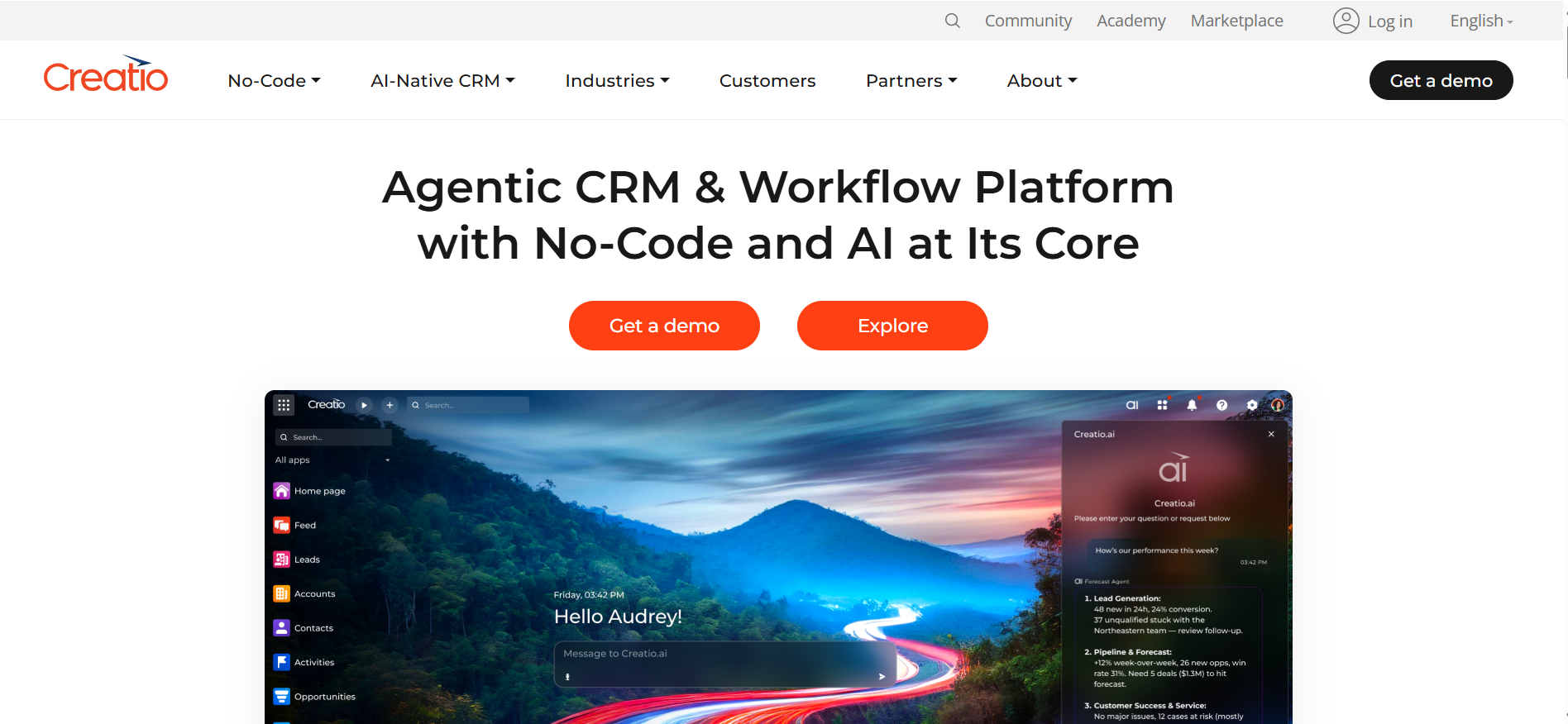
Overview
Creatio CRM is a cloud-based, low-code platform designed for businesses that want flexible and intelligent lead management with minimal technical setup. It combines powerful automation, AI-driven insights, and multichannel communication capabilities, allowing teams to capture, nurture, and convert leads efficiently. Creatio is suitable for small businesses, mid-sized companies, and enterprise organizations that require a customizable CRM that can adapt to evolving business processes.
The platform’s low-code environment enables teams to design custom workflows, dashboards, and lead management pipelines without extensive programming knowledge. Creatio also supports integration with email, social media, telephony, and third-party applications, providing a centralized hub for all lead-related activities. Its automation and analytics features help businesses streamline sales operations, improve lead prioritization, and enhance overall customer engagement.
Key Features
- Intelligent Lead Management: Automated lead capture, scoring, and prioritization based on AI-driven insights.
- Low-Code Workflow Customization: Design custom pipelines, dashboards, and automations without coding expertise.
- Multichannel Communication: Engage leads via email, phone, live chat, social media, and messaging apps from one platform.
- Process & Task Automation: Automate repetitive sales tasks, follow-ups, reminders, and lead nurturing workflows.
- Analytics & Reporting: Advanced reporting tools provide real-time insights into lead performance, sales trends, and team productivity.
Pros
- Low-code customization enables tailored CRM workflows without technical barriers.
- AI-powered lead scoring and prioritization improve conversion efficiency.
- Supports multichannel communication for seamless engagement with leads.
- Automation of tasks reduces manual work and increases productivity.
- Scalable platform suitable for businesses of all sizes, including enterprise-level organizations.
Cons
- Low-code customization may still require initial training for some users.
- Higher-tier plans can be expensive for small businesses.
- Some integrations with third-party tools require additional setup.
- Mobile interface is less feature-rich than the desktop version.
- Advanced analytics may be overwhelming for teams new to CRM systems.
Pricing (2026)
- Team: ~€25/user/month (annual); includes core CRM and basic automation features.
- Commerce: ~€50/user/month (annual); advanced workflow automation, AI lead scoring, and multichannel communication included.
- Enterprise: Custom pricing; full low-code customization, predictive analytics, advanced reporting, and priority support.
Final Verdict
Creatio CRM is an outstanding choice for businesses in 2026 that need a flexible, low-code solution for lead management. Its AI-driven lead scoring, multichannel communication, and workflow automation make it ideal for growth-oriented companies looking to streamline operations and improve conversion rates. Creatio’s scalable, customizable platform ensures that businesses can adapt their CRM to evolving needs, making it a future-ready solution for efficient lead management and intelligent sales operations.
Conclusion
Choosing the right CRM in 2026 can completely transform how your business manages leads, sales, and overall growth. Each CRM we’ve highlighted — from Zoho CRM and Salesforce to HubSpot and Creatio — offers unique features, pricing structures, and advantages. Some are ideal for small businesses seeking simplicity, affordability, and ease of use, while others are designed for larger organizations that require deep customization, AI-powered insights, and advanced analytics.
The key to selecting the best CRM is aligning its features with your business goals, team size, and budget. Whether you’re looking for AI-driven automation, efficient lead and pipeline management, integrated business applications, or customer-centric tools, there is a CRM solution that fits your needs. The right CRM can save time, improve team collaboration, enhance sales productivity, and deliver exceptional customer experiences, making it an essential investment for any business in 2026.
Frequently Asked Questions (FAQs)
Why should I use a cloud-based CRM for lead management?
A cloud CRM helps businesses efficiently capture, track, and nurture leads. It automates routine tasks, provides AI insights, improves lead scoring, and allows teams to manage prospects from anywhere, ensuring no opportunities are missed.
Which CRM is best for managing leads in small businesses?
For small businesses, CRMs like Zoho CRM, Pipedrive, and HubSpot are ideal. They offer easy lead capture, workflow automation, scoring, and mobile access, helping small teams prioritize high-potential leads without complex setup.
Which CRM is best for managing leads in large businesses?
Large organizations benefit from platforms such as Salesforce, Microsoft Dynamics 365, SugarCRM, and Creatio. These CRMs provide advanced lead scoring, AI-powered predictions, customizable pipelines, and analytics to manage large volumes of leads across multiple teams.
Can I switch CRMs later if my lead management needs grow?
Yes. Most cloud CRMs allow data export and integration with other tools, making it easy to upgrade or migrate your lead management system as your business expands and requires more sophisticated workflows.
Do all CRMs support mobile lead management?
Most modern cloud CRMs, including Zoho CRM, Salesforce, HubSpot, and Creatio, provide mobile apps. These apps allow teams to track leads, log communications, and update sales pipelines on the go, ensuring continuous lead management even outside the office.
